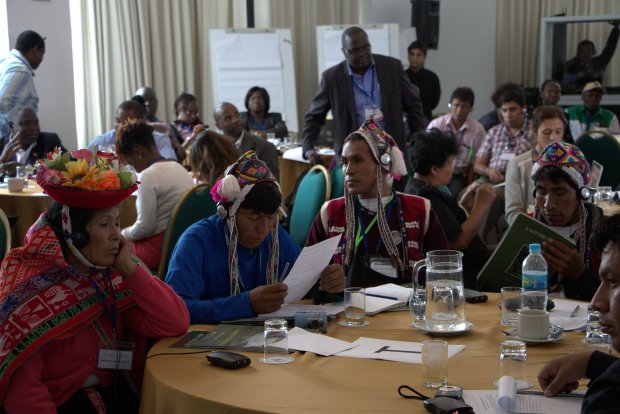The elephant in the room: Agriculture at the UNFCCC negotiations
 Farmers and youth are key players in putting agriculture on the agenda in the UN Climate Talks
Farmers and youth are key players in putting agriculture on the agenda in the UN Climate Talks
It is not always usual to find such a diverse group from different backgrounds, views and ages come together to discuss issues, especially in a small room. But when farmers, youth and the indigenous people’s representatives sat together with scientists, climate change negotiators and other stakeholders to discuss the future of agriculture in the UNFCCC negotiations, a vast diversity of views, aspirations and even clothing is exactly what was observed.
And, when it comes to ensuring that agriculture does not get locked out of a new United Nations global climate change agreement, such range of diverse views is needed to decide on the best way forward. To this end, a half-day workshop was organized on the sidelines of the recent UN Framework Convention on Climate Change (UNFCCC) negotiations in Lima Peru by the CGIAR Research Program on Climate Change, Agriculture and Food Security (CCAFS), to raise awareness on the status of agriculture in the negotiations and provide a networking space for farmers, youth representatives, and scientists.
For many years, agriculture has suffered neglect on the fringes of the COP negotiations, and many efforts to get it in via various negotiation streams or programs including Reducing Emissions from Deforestation and Forest Degradation (REDD+), the Clean Development Mechanism (CDM), have encountered stiff barriers. Although there has been progress in recent years in putting agriculture on the agenda, including agreement to to have discussions under SBSTA discussions in 2015, getting agriculture a real place at the table means taking a multi-pronged approach. And achieving this requires all sectoral stakeholders – farmers, scientists, youth groups – to engage their governments.
Click here to read the full article written by me, Oluwabunmi Ajilore, on CCAFS' website.
Related Posts
Comments
By accepting you will be accessing a service provided by a third-party external to https://archive.ypard.net/

